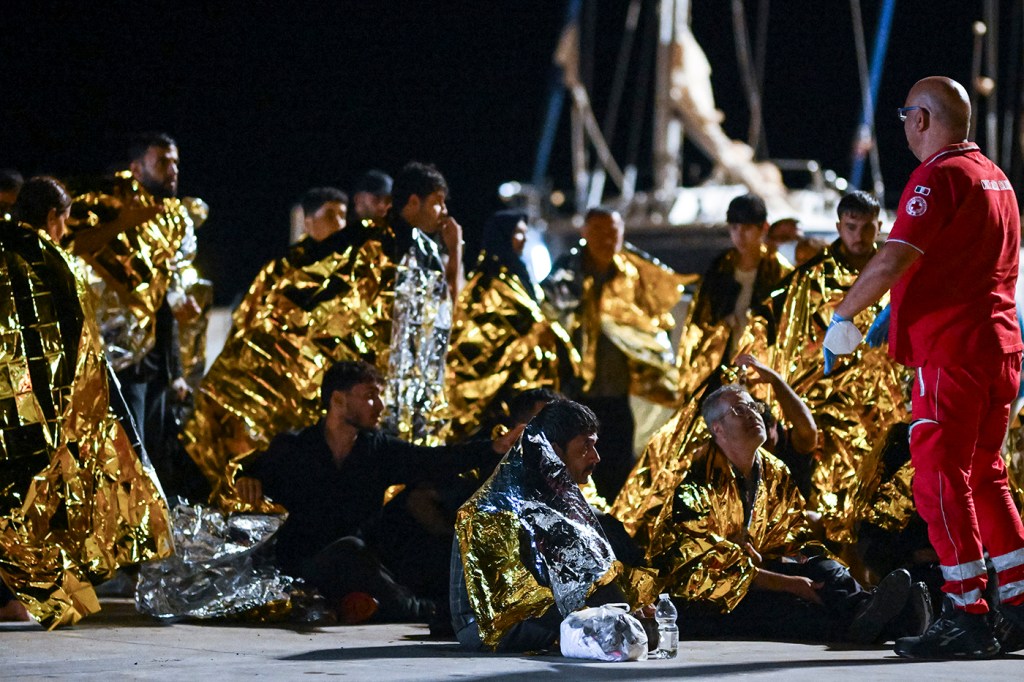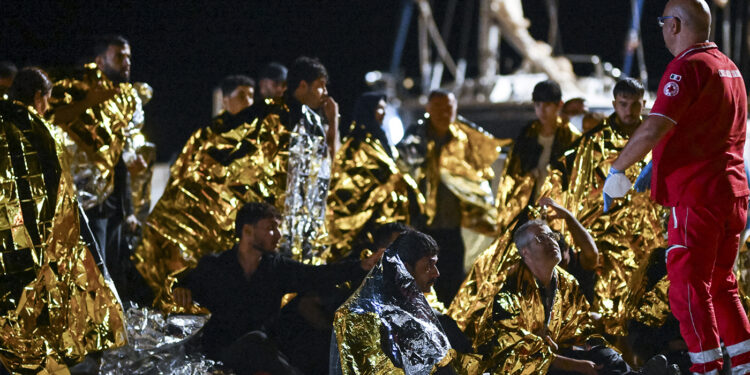Research by Northeastern University academic Marianna Griffini examines the logic governments in Rome have advanced when agreeing migration-deterring deals with Libya and Albania.
Share this story
Copy Link
Link Copied!
 Italy has signed migration deals with Libya and Albania in a bid to curtail the number of migrants landing on its shores. Photo by Valeria Ferraro/SOPA Images/LightRocket via Getty Images
Italy has signed migration deals with Libya and Albania in a bid to curtail the number of migrants landing on its shores. Photo by Valeria Ferraro/SOPA Images/LightRocket via Getty Images
LONDON — Across Europe, the anti-immigration rhetoric is growing louder.
Leaders in Germany and France, once seen as stalwarts behind a borderless European Union, have reacted to a rise in support for far-right parties by increasing border controls.
Last month, Berlin introduced greater land border checks in what some observers warned could be the end of the European Union’s Schengen Treaty that, in principle, provides for a passport-free area between the bloc’s 27 member countries.
France’s new interior minister, Bruno Retailleau, said last week that he wanted faster deportations of those who had “broken in” to his country.
Until a recent change of government, the United Kingdom was ready to deport asylum-seekers arriving via the English Channel in small boats to Rwanda.
Italy, with its huge coast and close proximity to North Africa and Eastern Europe, has been a popular target for asylum-seekers and economic migrants. Looking to tackle the number of migrants landing on its shores, Italy has signed deals with other countries to help create deterrents, including with Libya in 2017 and Albania in 2023.
Anti-migrant policies are often seen as a trait of right-wing administrations but new research co-authored by a Northeastern University professor shows how even centrist governments have been willing to “blur” their ideology to adopt a harder stance on border controls.
Marianna Griffini, an assistant professor in international relations and anthropology, and Matilde Rosina, a lecturer in global challenges at Brunel University London, analyzed Italian parliamentary debates taking place around the time when Rome signed the respective third country migration agreements.
In an article, “An Ideological Divide? Political Parties’ Discourse in Italy’s Migration Cooperation with Libya and Albania,” published in The International Spectator, the academics found that the arguments around migration centered around two themes: a security-based logic that focused on the country’s safety, and a rights-orientated logic that honed in on the human rights of migrants.
The pair found that, while those on the left of the migration debate were more likely to focus on migrant rights, that could be switched in a time of emergency. That was certainly the case, Griffini says, when the memorandum of understanding with Libya was signed by then Prime Minister Paolo Gentiloni, a politician from the center-left.
“Gentiloni’s administration stressed the requirement to fight migration, saying that it involved individuals who turn into ‘mafiosi’ and ‘criminals,’” says Griffini. “They wanted to turn an iron fist towards migrants because they were saying they wanted to protect security and integrity within the nation.
“During debates, they talked about it being an alarming situation.”
The memorandum was adopted against the backdrop of increasing migration to Italy. In 2016, the highest number of arrivals via sea were recorded since 2012, with more than 181,000 people landing on Italian shores.
In a deal worth $140 million, Rome and Tripoli agreed to fight against “irregular migration, trafficking and smuggling,” with Italy providing technical support to the Libyan Border Guard in a bid to reduce migrant boat departures. Italy and the EU also agreed to financially support migrant “reception centers” within Libya and to train staff operating such camps.
Griffini says MPs from Gentiloni’s Democratic Party did voice humanitarian concerns about the conditions of the reception centers but looked to avoid directly criticizing their own government.
The second deal — last year’s 670 million euro ($741 million) pact with Albania — made headlines the world over, with Griffini’s article calling it the “first of its kind.”
This time it was signed by a right-wing administration — current Prime Minister Giorgia Meloni and her Brothers Of Italy party are outspoken about protecting the country’s cultural heritage from an increase in migration.
The 2023 deal with Tirana, agreed in response to landings bypassing the 157,000 mark that same year, envisages the construction of two immigration centers in Albania to host and process migrants who have been rescued at sea by Italian military ships.
Griffini says it was designed to “disincentivize” migration and to “show a strong state” by closing off avenues of irregular arrival, with Meloni’s MPs and coalition partners falling back on security-based arguments to support the move. They “denounced immigration as a threat to social cohesion and to the economy” and looked to drive home “their toughness” on the issue, says the London-based academic.
In contrast with their stance six years prior when the Libya deal was signed, the center-left opposition parliamentarians went “back to their own traditional ideological position” and started “invoking humanitarian arguments.”
Meloni’s Albania plan withstood domestic resistance with help from the backing of the European Commission and major European national leaders such as German Chancellor Olaf Scholz, who argued that Italy was simply working on migration with a country that was likely to “quite soon … be a member of the EU.” The premier was able to point to Brussels’ support as a way of validating outsourcing the processing of asylum seeker claims.
Scholz, only months after offering his support for Italy, would go on to approve the extension of border checks in his own country.
Support for far-right and anti-migrant parties, both in domestic and EU elections, has forced politicians of all persuasions — including in powerhouse countries such as France and Germany — to consider a security-based approach to dealing with migration, Griffini says.
“Ultimately, if we take the temperature of the population, what comes out is that we have a sizable chunk that is attracted by the far-right,” says the populism expert.
“And if mainstream governments want to survive the attack from the far-right, they need to lure some voters away from that camp.
“I’m not saying that these parties have changed their ideology out of the blue. That kind of change would take longer but there are some strategic considerations to be made. If you want to gain the votes that you have lost, you will need to win back your core electorate.”
World News
Recent Stories
:where(:not(.alignleft):not(.alignright):not(.alignfull)){max-width:600px;margin-left:auto !important;margin-right:auto !important;}.wp-container-core-group-is-layout-2 > .alignwide{max-width:1280px;}.wp-container-core-group-is-layout-2 .alignfull{max-width:none;}.wp-container-core-group-is-layout-2 > *{margin-block-start:0;margin-block-end:0;}.wp-container-core-group-is-layout-2 > * + *{margin-block-start:var(–wp–preset–spacing–40);margin-block-end:0;}.wp-container-nunews-collateral-is-layout-1{flex-direction:column;align-items:stretch;}.wp-container-nunews-collateral-is-layout-2{flex-direction:column;align-items:stretch;}.wp-container-core-group-is-layout-4 > :where(:not(.alignleft):not(.alignright):not(.alignfull)){max-width:832px;margin-left:auto !important;margin-right:auto !important;}.wp-container-core-group-is-layout-4 > .alignwide{max-width:832px;}.wp-container-core-group-is-layout-4 .alignfull{max-width:none;}.wp-container-core-post-content-is-layout-1 > :where(:not(.alignleft):not(.alignright):not(.alignfull)){margin-left:auto !important;margin-right:auto !important;}.wp-container-core-post-content-is-layout-1 .alignfull{max-width:none;}
]]>
Source link : https://news.northeastern.edu/2024/10/03/europe-borders-research-italy-migration/
Author :
Publish date : 2024-10-03 18:16:51
Copyright for syndicated content belongs to the linked Source.


